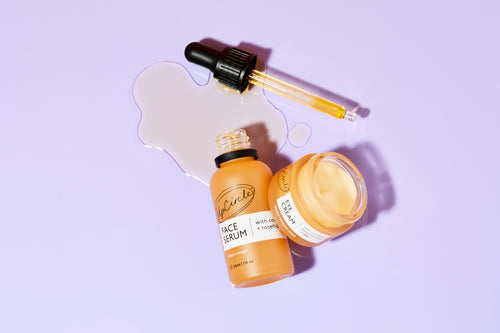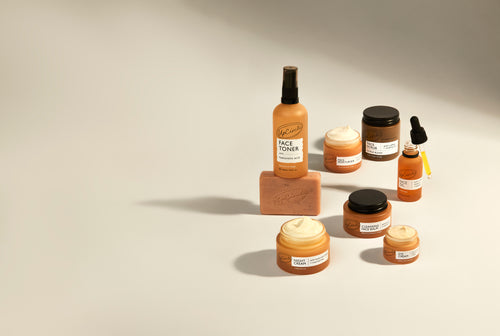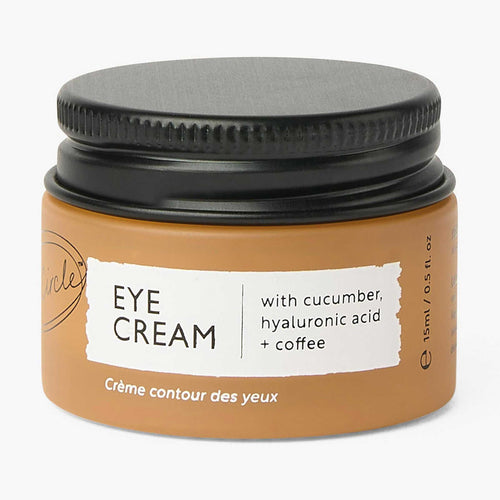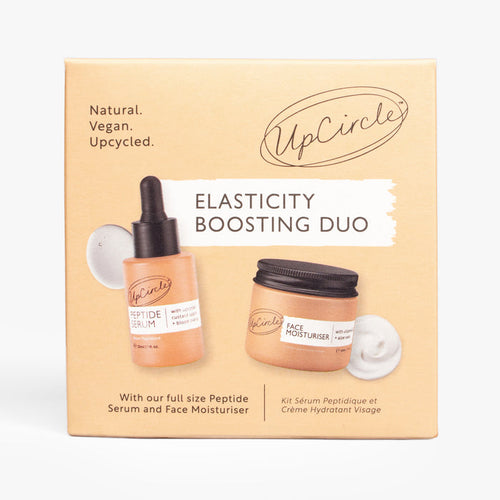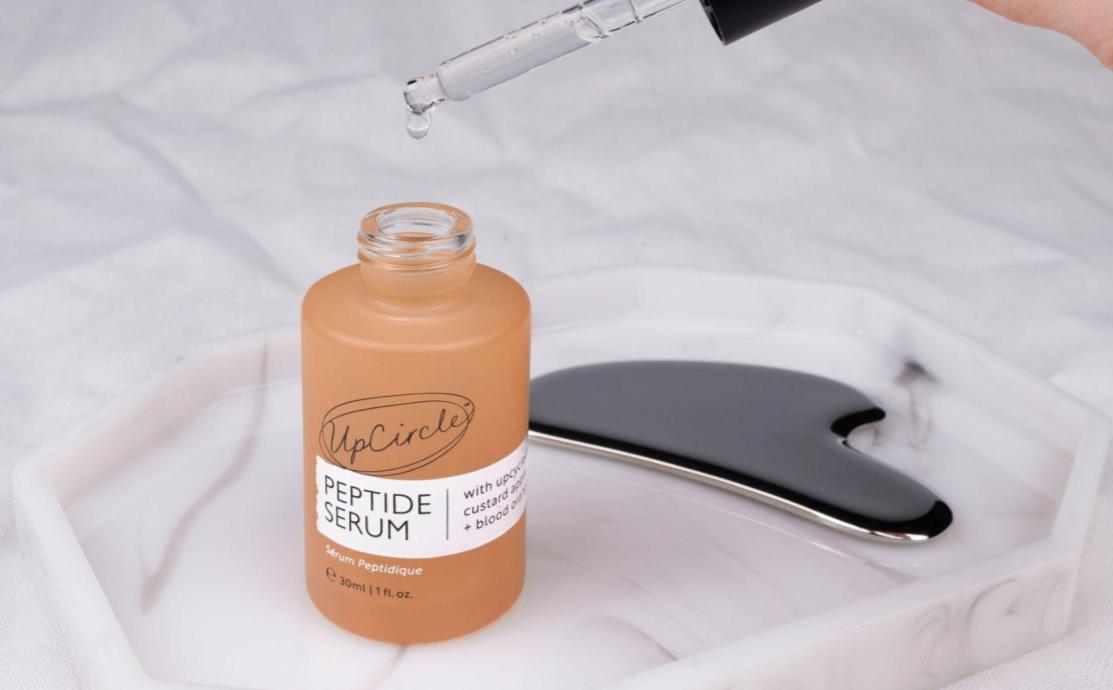Skincare routines can become complex, with various steps and products to navigate. Serums deliver hits of hydration and effective active ingredients in just a few drops – making them an essential part of your routine.
What is a water-based serum?
A water-based serum is formulated primarily with water as its main ingredient, designed to deliver concentrated active ingredients to the skin. They are able to absorb quickly into the skin without leaving a greasy residue.
Water-based serums are typically lighter and less oily compared to oil-based serums. Most are non-comedogenic, meaning they are less likely to clog pores – making them suitable for all skin types, especially for those with oily or acne-prone skin.
Common ingredients in water-based serums
Hyaluronic acid
Known for its ability to hold up to 1000 times its weight in water, hyaluronic acid not only provides intense hydration, but also prevents the skin losing moisture to evaporation.
Vitamin C
An antioxidant protecting the skin against free radical damage, vitamin C also helps to brighten the skin and reduce the appearance of dark spots.
A popular skincare vitamin, vitamin C is also essential for collagen production in the skin, helping your skin retain its structure and improve the skin’s elasticity.
Niacinamide
A form of vitamin B3 that helps to improve skin texture, reduce redness, and minimise pores, it’s no wonder why niacinamide is such a popular skincare ingredient. Niacinamide also has anti-inflammatory properties which can help to soothe acne-prone skin and reduce further breakouts.
Peptides
Strings of amino acids which occur naturally in the body, peptides act as the building blocks for proteins such as collagen. These proteins, including keratin and elastin, play a significant role in keeping your skin healthy and happy.
When to use a water-based serum
Water-based serums are ideal for layering under other skincare products such as moisturisers and sunscreens. Their lightweight nature ensures they do not feel heavy when combined with other products – if applied in the correct order.
Apply your serum after cleansing and toning the skin. Apply a few drops to the skin and massage in upwards motions, ensuring the product is fully absorbed by the skin. For a few moments of luxury, use a gua sha to massage your skin.
Following your water-based serum, apply moisturiser, face oil, and sunscreen.

Water-based serum vs oil-based serum
Both water-based serums and oil-based serums have their respective benefits and places in your skincare routine – but knowing how they work is important to getting the maximum benefits from them.
Choosing your serum
Formulated primarily with water, water-based serums are lightweight and easily absorbable. These types of serums are suitable for all skin types, especially oily, acne-prone, and combination skin.
Water-based serums provide intense hydration without the need for adding oil – which those with acne-prone skin may be reluctant to do.
On the other hand, oil-based serums are typically formulated with various nourishing oils, such as jojoba oil, sunflower oil, and rosehip oil. They are thicker and more emollient as opposed to water-based serums.
Oil-based serums and face oils are rich in fatty acids, vitamins, and antioxidants that nourish and restore the skin’s natural barrier. They absorb more slowly than water-based serums, often leaving a dewy or slightly oily finish to the skin.
They create a protective barrier that locks in moisture and prevents transepidermal water loss – water loss through evaporation. These serums provide deep nourishment and can improve both skin elasticity and suppleness.
While some people may only want to use one serum in their routine, both water-based serums and face oils offer wonderful skin benefits for you to reap.
UpCircle’s water-based serums
By now, we hope you’ve heard the news that we are renaming our best selling Face Serum to Face Oil. This change will be gradual as we use up all of the current stock we have – it wouldn’t align with our values to scrap the old packaging that we currently have in stock for the sake of one word.
You can find out more about the product name change in the blog: We’re Renaming Our Face Serum to Face Oil.
To give you a quick insight into why we’re doing this, the product formulation of the current Face Serum is in fact 100% oil-based, so describing it as an oil better reflects its true nature.
Because our Face Oil is completely oil-based, it should be used after moisturiser. The oil works through occlusion, forming a protective seal over the previous layers of moisture and locking it all in.
Another reason for the change is that we have been busy behind the scenes developing a hydrating water-based serum, so want better clarity between the existing oil-based product and new water-based serum.
Peptide Serum
We’ve launched our very own Peptide Serum and couldn’t be more excited!
Featuring a groundbreaking formulation that combines both the power of a tripeptide complex with the sustainability-driven goodness of upcycled custard apple and blood orange water – this serum is UpCircle’s most innovative formula yet.
Small yet mighty molecules, peptides help to aid the production of collagen, promoting skin elasticity, and reducing the appearance of fine lines and wrinkles.
Custard apple is rich in antioxidants, helping to protect the skin from environmental damage and promote a radiant complexion. It is also an adaptogen that works in sync with the natural body's mechanisms. Meanwhile, blood orange water provides hydration and brightening properties, leaving the skin looking refreshed and revitalised.

Hair Serum with Fermented Rice Water + Baobab
Our natural Hair Serum is water-based and blends several hair-loving ingredients: sustainably sourced upcycled baobab extract, upcycled fermented organic rice water, and science-backed active ingredients. which combine to protect, hydrate, and smooth every strand.
Baobab extract is a multifunctional protein that delivers 5-in-1 anti-ageing care: repair, strength, UV protection, moisture retention, and nourishment. Ultimately, it helps your hair stay resilient and well-hydrated.

Discover our full range of skincare, haircare and fragrance.

